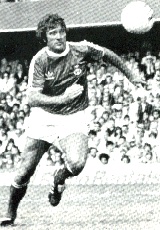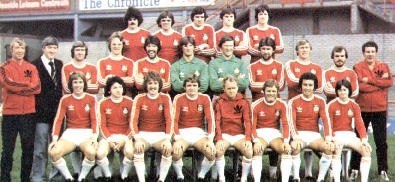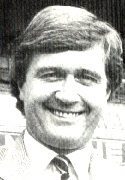
Dixie McNeil
Richard “Dixie” McNeil: born Melton Mowbray, January 16, 1947.
Dixie McNeil was an honest, strong, brave forward of the 1970’s who made such a habit of putting the ball in the back of the net that he became an idol at a string of lower league clubs. That he never got the chance to prove his worth at a higher standard can probably be attributed to his somewhat belated entrance as a recognised goalscorer.
Dixie McNeil is best known as a bustling forward with a fearsome scoring record.
McNeil’s prowess as a schoolboy led to him signing for his local club Leicester City. The Foxes were a capable first division side at the time and the strength and raw boned talents of McNeil were deemed unworthy of the top flight. In 1966 Leicester allowed the nineteen year old McNeil to leave on a free transfer and he moved to Exeter City in the fourth division.
McNeil made his league debut, somewhat prophetically, against Wrexham at the Racecourse Ground in a 0-0 draw. Without setting the world on fire, as few do at Exeter, McNeil made a solid start with the Grecians and top scored for the club with 11 goals from 31 games.
Bizarrely the club decided not to renew his contract at the end of this first season and once again Dixie found himself on the end of a free. This time the young goalscorer was allowed to slip out of league football and although this did not stop him from returning later to wreak havoc throughout the lower divisions it cannot have helped his development as a footballer and probably put paid to any loftier ambitions.
The club McNeil landed at was Corby Town and although he continued to find the net his new side were relegated from the Southern League Premier Division after his first season with them. His performances the following season persuaded Northampton Town that McNeil deserved another shot at league football and the grand sum of £5,000 saw him begin the journey to becoming a legend in earnest.
The highlight of McNeil’s time at Northampton came early on as the club were drawn at home to Manchester United in the F.A. Cup. It was the first opportunity for McNeil to make his mark on something bigger than a parochial audience and he duly scored one of his sides’ two goals in typically forthright style. Unfortunately for McNeil and his teammates a certain George Best scored six at the other end in an 8-2 United victory.
It was at the start of the 1971-72 season that McNeil really began to hit the goal trail with a vengeance. He managed 14 league goals in a struggling Northampton side before moving towards the upper reaches of the fourth division with a January move to Lincoln City. By the end of the season he had banged in another 13 for the Imps. In each of the next five seasons he would be the leading scorer for his club.
McNeil hit 21 and 19 league goals in his next two seasons at Sincil Bank and this led to Hereford United splashing out £15,000 to take him into the third division. They also agreed to pay an extra £5,000 if McNeil managed 20 goals in his first season. They should have handed it over there and then.
In a team that finished only 14th McNeil scored 31 goals. The following season as Hereford made off with the third division championship he rattled in 35 goals in 41 appearances.
These were heady times for the relative Football League newcomers. Hereford were inspired by the presence on and off the field of the evergreen Terry Paine. The former Southampton and England winger still had the brains and the touch to lead opponents at this level a merry dance and in McNeil he found the ideal man to profit from his probings. Overseeing it all was John Sillett, a big, bubbly character who McNeil admitted to being scared of when the team lost. If Dixie was worried you can bet the rest of them were terrified.
Dixie McNeil was approaching 30 now and his goalscoring exploits were not enough to provoke interest from the first division. Outside the top flight, however, he continued to plunder goals. Even as Hereford finished bottom of the second division McNeil scored 16 times at almost a goal every other game.
 It is noticable that this profile has contained more figures and less description than any other done on this site so far which is as it should be. Dixie was more interested in quantity than quality throughout his career and he plied his trade with the single minded focus that all great goalscorers possess. He lived for goals and would often contribute little else to the game. Once the ball was played into the box or down the side of a centre half for him to run onto, however, he came alive.
It is noticable that this profile has contained more figures and less description than any other done on this site so far which is as it should be. Dixie was more interested in quantity than quality throughout his career and he plied his trade with the single minded focus that all great goalscorers possess. He lived for goals and would often contribute little else to the game. Once the ball was played into the box or down the side of a centre half for him to run onto, however, he came alive.
Solidly built and almost impossible to stop once into his stride Dixie McNeil had the natural goalscorers instinct. He knew when to blast a shot and when to place it. He knew when to aim high and when to aim low. He knew when to shoot and when to use his head, or when to use some other part of his body if the need arose. Whatever was best suited to getting the ball into the net is what he would invariably do. It came as naturally as breathing.
Hereford returned to Division Three and continued to struggle. With the club in some disarray McNeil was sold to Wrexham for £60,000. McNeil had managed 3 goals in 7 games. By the time the season finished with Hereford relegated the clubs leading scorer would have managed only 5.
When Dixie McNeil arrived at the Racecourse Ground, Wrexham were scarcely better off, lying in 18th place with just one win in seven games. There was the makings of a strong side there, however, and McNeil would prove the catalyst. Replacing Billy Ashcroft who had left for Middlesborough, McNeil provided the cutting edge that the creative talents such as Mickey Thomas, Bobby Shinton, Les Cartwright and Graham Whittle demanded.

Wrexham’s season instantly took off.
McNeil scored on his debut as Wrexham beat Swindon and by the end of October the club were at the top of the league. They would only surrender this position for a brief spell just after Christmas and only then because their fantastic cup runs left them with a batch of fixtures to make up.
Dixie McNeil had to sit out the clubs excellent march to the 5th round of the League Cup and eventual defeat by Liverpool as he was cup tied after playing in the competition for Hereford. He took out all his frustrations on Wrexham’s FA Cup opponents as they enjoyed a memorable run to the quarter finals. Wrexham played nine games in the FA Cup that season and McNeil scored in all of them. In total he managed eleven goals in the competition after scoring twice in both the 4th round games with Newcastle United, Wrexham winning 4-1 at the Racecourse after a 2-2 draw at St James Park.
The 5th round took Wrexham back to St James Park. Having spent the season giant killing it looked as though they were about to become the victim themselves as non league Blyth Spartans led 1-0 at the Racecourse Ground with the game entering injury time. Then, from a re-taken corner, McNeil bundled in the equaliser and it was back to the North East for another replay.
In front of over 42,000 people Dixie McNeil scored a magnificent goal to put Wrexham two up on the way to a 2-1 win and a quarter final tie at home to Arsenal. McNeil scored again and gave Willie Young a torrid time in a highly physical duel but the Gunners came through to win a thriller 3-2.
Dixie McNeil missed the remainder of the season through injury as Wrexham cruised to promotion but with 13 league goals in 23 appearances he had done more than his share in securing the title. The Wrexham public took McNeil to their hearts both on and off the pitch and their affection for him has never wavered.Wrexham managed four seasons in the second division and, after a slow start, McNeil proved again that he could score goals at that level, even well into his mid 30’s.
The FA Cup continued to offer highlights and Dixie scared several more first division defences before he was through. There were also a couple of brief, though praiseworthy, excursions into Europe and McNeil managed to score in the narrow defeats against NK Rijeka and FC Magdeburg.
 Shortly after relegation back to the third division, Dixie McNeil left Wrexham and headed back to Hereford but the club was by now in a depressed state and the return did not last long. On the announcement of his retirement the Shropshire Stars’ David Lovett commented that McNeil “had a tremendous sense of humour,” and added that “now he won’t have to take his teeth out when he goes to work.”
Shortly after relegation back to the third division, Dixie McNeil left Wrexham and headed back to Hereford but the club was by now in a depressed state and the return did not last long. On the announcement of his retirement the Shropshire Stars’ David Lovett commented that McNeil “had a tremendous sense of humour,” and added that “now he won’t have to take his teeth out when he goes to work.”
McNeil later returned to Wrexham as manager and did his utmost to guide the club through a period of financial uncertainty. In 1985, with his squad decimated by injury, McNeil made a brief appearance as a substitute at Notts County in an FA Cup replay. Within minutes of his arrival McNeil had to make a quick return to the bench. He had forgotten to take his teeth out.
Still a well known figure in the Wrexham area and with a brick bearing his name in the rebuilt stadium Dixie McNeil certainly qualifies as a club legend.
Dixie McNeil Career Statistics
CLUB GAMES GOALS
Exeter City 31 11
Northampton Town 86 33
Lincoln City 97 53
Hereford United 129 85
Wrexham 167 54
Hereford United 12 3
TOTAL 542 239
